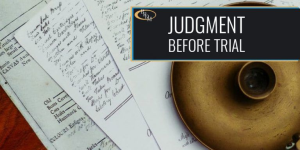INTRODUCTION
In the intricate tapestry of the legal system, the term “summary judgment” holds significant weight, as it represents a critical juncture in legal proceedings. At its core, summary judgment allows one party to seek a judgment in their favor without the need for a full trial. However, the opposition to summary judgment is a vital safeguard to ensure justice prevails. In this essay, we will delve into the reasons, procedures, and importance of opposing summary judgment in the legal landscape.
UNDERSTANDING SUMMARY JUDGMENT

“Is the motion for summary judgment valid, pending crucial evidence?”
Summary judgment is a legal mechanism that permits a party involved in a lawsuit to request a judgment in their favor before a trial commences. To grant a summary judgment, a judge must determine that there are no genuine disputes of material fact in the case, and the moving party is entitled to judgment as a matter of law. In other words, if the court believes that the facts of the case are clear, and there is no need for a trial to resolve them, a summary judgment can be issued.
“IS FILING A MOTION FOR SUMMARY JUDGMENT ADVISABLE IF EVIDENCE IS STRONG?”
The party seeking summary judgment typically asserts that there is no necessity for a full trial because the essential facts and applicable law are unequivocally in their favor. These grounds for seeking summary judgment often include:
- Lack of Evidence: The moving party may argue that the opposing party cannot provide sufficient evidence to substantiate their claims, making a trial superfluous.
- Legal Sufficiency: They might contend that even if all the facts presented are true, the law inherently supports their position, rendering a trial unnecessary.
- Failure to State a Claim: The moving party can assert that the opposing party’s complaint or claims lack the legal basis to proceed.
OPPOSING SUMMARY JUDGMENT; “CAN A MOTION FOR SUMMARY JUDGMENT SUCCEED WITH COMPELLING, UNDISPUTED EVIDENCE?”
“Defending Justice: The Art of Opposing Summary Judgment in Legal Battles”
Opposing summary judgment is not only a right but also a critical strategy to safeguard one’s interests and ensure a fair legal process. Here are the key steps and strategies to consider when opposing a motion for summary judgment:
- Gather and Present Contradictory Evidence: To counter the motion, it is essential to present evidence that creates a genuine dispute of material fact. This often involves depositions, affidavits, expert opinions, or other forms of evidence that challenge the moving party’s assertions.
- Emphasize Applicable Law: Demonstrate that there are legitimate legal issues that require a trial to be resolved. Highlight relevant legal precedents and statutes that support your case.
- Challenge the Moving Party’s Evidence: Carefully scrutinize the evidence presented by the party seeking summary judgment. If there are inconsistencies, factual disputes, or issues with their evidence, it is crucial to bring these to the court’s attention.
- Utilize Affidavits and Declarations: Submit affidavits or declarations from witnesses who can testify to disputed facts. This can be instrumental in establishing genuine issues that warrant a trial.
- Expert Testimony: If the case involves complex issues, consider presenting expert testimony to demonstrate that the case necessitates a trial for a proper evaluation of the evidence.
- Procedural Defenses: Examine whether there are any procedural issues with the summary judgment motion itself, such as incorrect filing or failure to adhere to specified time limits. Identifying procedural errors can be an effective defense.
- Request Additional Discovery: If you believe that further discovery is necessary to uncover crucial evidence, you can petition the court to allow additional time for discovery before ruling on the summary judgment motion.
THE IMPORTANCE OF OPPOSING SUMMARY JUDGMENT
Opposing summary judgment is not merely a procedural formality; it is a safeguard to protect the principles of justice and fairness in the legal system. Here’s why opposing summary judgment matters:
- Preserving the Right to a Fair Trial: By opposing summary judgment, individuals and entities ensure that they have the opportunity to present their case before a judge or jury, preserving the fundamental right to a fair trial.
- Preventing Hasty or Unjust Outcomes: Summary judgments, when granted prematurely, can lead to hasty or unjust outcomes. Opposing summary judgment allows for a more thorough examination of the case, reducing the risk of erroneous judgments.
- Ensuring Due Process: Opposing summary judgment upholds the principle of due process, ensuring that all parties have a full and fair opportunity to present their arguments and evidence.
- Promoting Legal Accountability: By requiring a full trial when genuine disputes exist, opposing summary judgment ensures that parties are held accountable for their actions in a transparent and accountable legal process.
CONCLUSION
Opposition to summary judgment is a fundamental aspect of the legal system that upholds the principles of justice, fairness, and due process. Understanding the reasons for seeking summary judgment, the steps involved in opposing it, and the importance of this process is essential for any individual or entity engaged in legal proceedings. It is a powerful tool to ensure that disputes are resolved in a manner that is just and equitable, safeguarding the integrity of our legal system. Cvv
